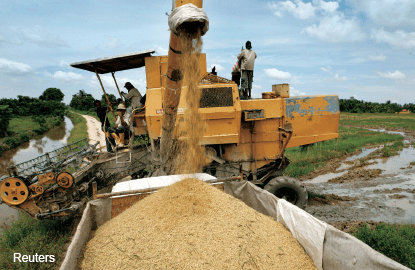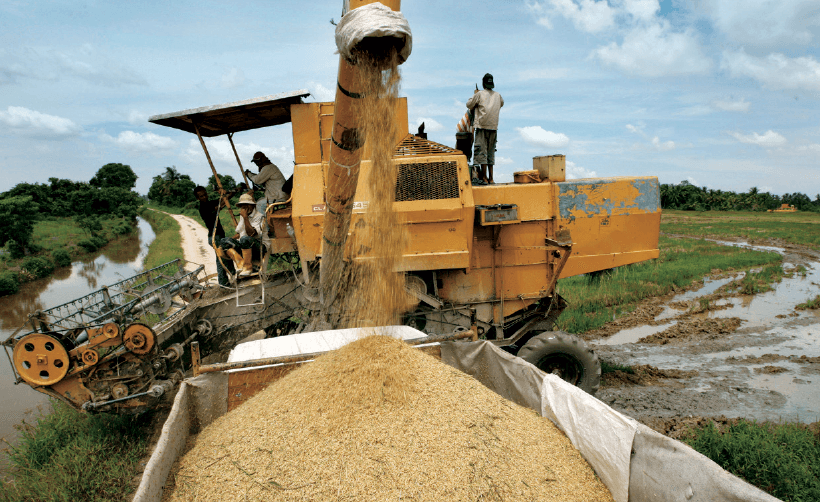
This article first appeared in The Edge Malaysia Weekly, on November 30 - December 6, 2015.

FEW industries in Malaysia have barriers to entry that are as high as for rice importing but Halex Holdings Bhd seems to have got past them.
Last week, the company, which specialises in the import and distribution of agrochemical and fertiliser products, announced that it had secured from Koperasi Majlis Belia Felda Malaysia Bhd (KMBFMB) a RM184 million contract to procure and package 80,000 metric tons (MT) of rice under the Food Bank project.
The Edge has learnt that Halex’s newly acquired 70%-owned subsidiary SL Aktif Sdn Bhd (SLASB) has also been granted a similar contract for 50,000 MT of white rice.
Halex now has a new source of income and a lucrative one at that. It can purchase up to 130,000 MT of white rice annually for two years under the contract, which may be extended for another year subject to mutual agreement.
A source close to the matter tells The Edge that Padiberas Nasional Bhd (Bernas) is still officially the only entity mandated to import rice into Malaysia. However, since February, the government has been making “special arrangements” to loosen the agency’s grip on the industry.
The source says the Ministry of Agriculture gave KMBFMB a “pelepasan khas” (special waiver) in July, which is renewable on an annual basis, to import 200,000 MT of rice through Bernas. Unlike Bernas, KMBFMB will have the freedom to conduct necessary due diligence to choose its own rice millers and suppliers outside Malaysia and store rice in its own warehouses.
In turn, KMBFMB awarded Halex two contracts “to get the work done”. The company will purchase, package and deliver the rice to KMBFMB’s distribution centres. The rice will then be sold on the open market as well as in KMBFMB’s own grocery chain called D’Mart.
The source explains that the rationale of the move is to supply Malaysians with higher-quality rice at lower prices while diminishing the Bernas monopoly at the same time.
“Bernas has had a monopoly of the market for a long time and it enjoys high premiums for the supply of rice. The main reason the government is doing this is to show Bernas that other government-linked companies (GLCs) can do the same job. They can provide better-quality rice directly to end-users in a shorter period of time,” the source says.
“For all the rice that Bernas is importing, the Malaysian market is still seeing a supply shortfall of 15%. So, that is where KMBFMB comes in. Eventually, such special arrangements will be made for other GLCs like the Federal Land Consolidation and Rehabilitation Authority (Felcra).”
Malaysia produced over 1.7 million MT of milled rice, imported over 1.1 million MT and consumed over 2.7 million MT, according to a report by the United States Department of Agriculture.
For Halex, the country’s rice needs present it with a golden opportunity to make profit. “Halex will earn gross margins of RM200 per MT, or about 8%, given a market price of RM2,300 for our effort in sourcing and procuring Super Special Import 5% rice for KMBFMB,” it says in an email response to The Edge. “This year, the focus is the rice contract from KMBFMB, which will start contributing to our revenue and bottom line from next year.”
There is no guarantee that KMBFMB will purchase all of the rice Halex’s subsidiaries can procure and package. The actual volume will be subject to orders received while the price may be adjusted to the prevailing supply market price.
Yet, assuming the best-case scenario and taking the RM200 MT premium into account, Halex stands to gain RM26 million in gross profit. This is a manifold jump from the company’s current earnings level. In its financial year ended Sept 30, 2014, Halex recorded a pre-tax profit of RM3.1 million on revenue of RM94.5 million. The year before, gross profit was RM4.8 million on a top line of RM96.4 million. It is also worth noting that the company has a market capitalisation of RM54.5 million.
Halex calls the rice deal “a huge step forward” and it is not difficult to see why.
The award of the rice contract came a week after Halex announced on Bursa Malaysia that it had acquired a 70% stake in SLASB — which had secured a similar contract from KMBFMB on Aug 17 — for RM100,000.
“There were no tenders or bids for the job since it is a new type of arrangement. Halex got the job because it approached KMBFMB on a recommendation and proved that it had the financing capability to procure rice,” says an executive familiar with the contract.
In response to a Bursa Malaysia query, Halex said it would be sourcing rice from Thailand, Cambodia, Vietnam and Myanmar . This is remarkable because Bernas is the country’s sole importer of rice.
Formerly known as Lembaga Padi dan Beras Negara, Bernas was corporatised in 1994 and subsequently listed on Bursa. In 2013, it was taken private after a conditional joint offer from Tradewinds (M) Bhd and parties linked to tycoon Tan Sri Syed Mokhtar Albukhary. It has a concession to manage the national rice stockpile or to maintain a 45-day reserve supply or 292,000 MT for the country at any given time until 2021.
Save by subscribing to us for your print and/or digital copy.
P/S: The Edge is also available on Apple's AppStore and Androids' Google Play.